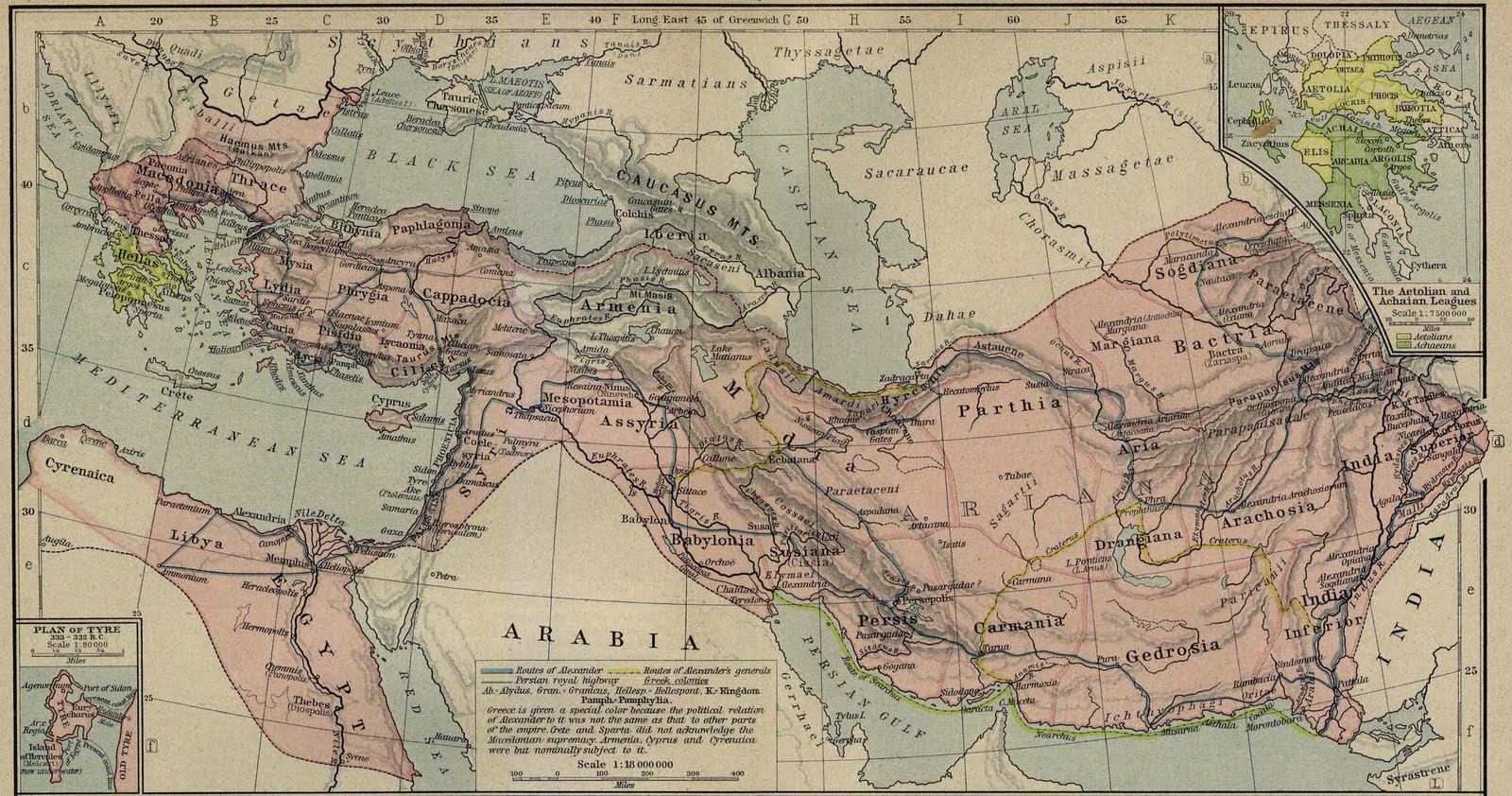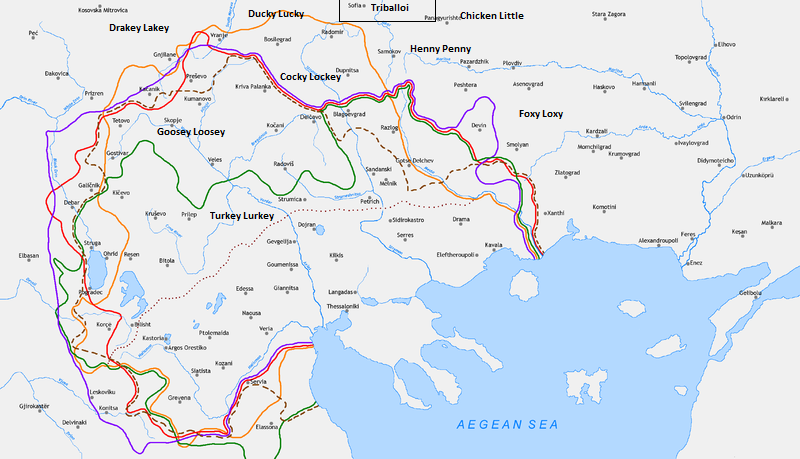Arrian takes pride in his work, most notably in the two prologues in Book One. In these passages he directly addresses the reader, stressing the greatness of his subject and, by association as his chronicler, of himself. I think it’s worth taking a minute to look at Arrian’s claims in these prefaces or prologues. The […]
Month: 14 years ago
Alexander’s shrewdness when choosing the appropriate action to advance short- and long-term goals lies in his ability to take differing positions when necessary. This post looks at a few of his different approaches to battles in Book One of The Landmark Arrian: The Campaigns of Alexander, translation by Pamela Mensch (source for all quotes). Alexander […]
Part of Alexander’s greatness or shrewdness derived from his ability to choose an action that advanced his short- and long-term goals. The next couple of posts will look at Book I of Arrian’s history and highlight a few of these choices and how they furthered his objectives even though his actions can appear inconstant and […]
Picture sourceOne great thing about the Landmark editions is the support provided within each book: maps, indexes, annotations, appendices help make reading the work more rewarding and enjoyable. Providing an online resource post for a book from the series seems unnecessary but I like to do it anyway. The Internet Ancient History Sourcebook links related […]
Envoys now visited Alexander from all the other autonomous tribes settled near the Danube and from Syrmos, the king of the the Triballoi. Envoys also arrived from the Celts who dwelt on the Ionian Gulf. Men of enormous stature, the Celts had a high opinion of themselves. All the envoys had come desiring Alexander’s friendship, […]
So what to think of Socrates’ defense and Plato’s presentation of it? There are a few points I want to get down on paper (I wrote this at a Easter family get-together) while the dialogue still rattles around in my thoughts. Having read Thucydides a few months ago, Socrates’ dialogue with the city of Athens […]
I have linked to a few resources during my posts on Plato’s Apology but I thought it might be helpful to have all of them in one place. As I’ve mentioned in an earlier post, a simple internet search will turn up a wealth of information but these are a few I thought looked helpful […]
This post looks at Plato’s Apology from 38b to the end at 42a. The jury returns with Socrates’ sentence of death and he gives his last speech in the Apology following a three-part construction, similar to many other parts in the work. In this instance he speaks to those that condemned him to death and/or […]
This post looks at Plato’s Apology from 35e to 38b, Socrates’ response to his conviction and his offers for punishment. I’m going to quote and paraphrase Plato’s presentation based on G.M.A. Grube’s translation. Socrates begins his speech after the jury has returned with a verdict of guilty and Meletus has asked for a penalty of […]
This post looks at Plato’s Apology from 34b to 35e which encompasses Socrates’ closing defense statement. I’m going to quote and paraphrase Plato’s presentation based on G.M.A. Grube’s translation unless otherwise noted. Socrates says he will not beg the jury for acquittal, nor will he bring family and friends to arouse all possible pity. But […]
This post looks at the section of Plato’s Apology from 28a to 34b, wrapping up the last of Socrates’ formal defense. In this section Socrates turns to what he really wants to talk about—what makes Socrates Socrates and what Athens should be doing. This section builds slowly but surely as Socrates explores the virtues to […]
This post looks at the section of Plato’s Apology from 24b to 28a, where Plato directly addresses the accusations of Meletus. I’m going to quote and paraphrase Plato’s presentation based on G.M.A. Grube’s translation. This section proves to be the only sustained address by Socrates to the formal charges. Even here he seems to treat […]
I wanted share the first few discussion questions on Book I for Reading Odyssey, Inc.’s book group on The Campaigns of Alexander by Arrian. The page numbers refer to The Landmark Series’ version of the book. If you’re interested in joining the group, see this post for the schedule and a link to the Reading […]
Diana Gilliland Wright provides updated information and links on “The Marathon Stone,” an amazing stone that appears to be the casualty list from the battle of Marathon. The inscription is written in boustrephon and diagonally (see comments for update), and was acquired by Herodes Atticus when he honored his home town of Marathon by constructing […]
This post looks at the section of Plato’s Apology from 21a to 24b in which Plato explores the impact of the Delphic oracle. I’m going to quote and paraphrase Plato’s presentation based on G.M.A. Grube’s translation. (21a – 23b) In the previous post I mentioned how the oracle at Delphi told Chaerephon, in reply to […]
This post looks at the section of Plato’s Apology from 19a to 21a which addresses the old prejudice against Socrates, gives his view of teaching sophistry, and presents the Delphic oracle on his wisdom. I’m going to paraphrase Plato’s presentation since this section is longer using G.M.A. Grube’s translation and add comments as I go. […]
This post looks at the section covering 18a to 19a of the Apology which comes after Socrates’ introduction in the previous section and lays out how he will respond to his charges. I’ll quote from the Benjamin Jowett translation at Project Gutenberg. And first, I have to reply to the older charges and to my […]
I’ll quote from the Benjamin Jowett translation at Project Gutenberg, although I may occasionally reference the G.M.A. Grube translation in my book. How you, O Athenians, have been affected by my accusers, I cannot tell; but I know that they almost made me forget who I was—so persuasively did they speak; and yet they have […]
I’m going to take a slightly different approach with Plato’s Apology. The work is remarkable and I think worth exploring (or revisiting for those who have already read it) so I’ll take extra time and posts to quote excerpts and make comments along the way. I’d like to quote the first paragraph of the introduction […]


